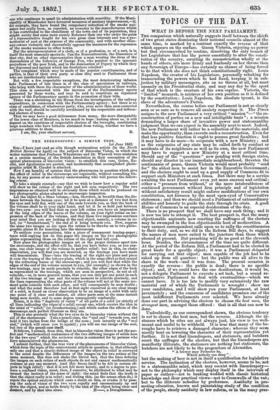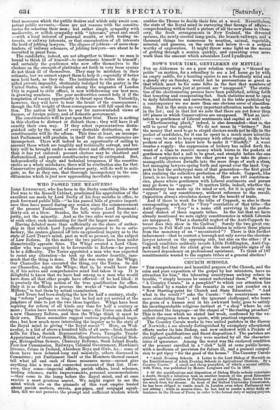TOPICS OF THE DAY.
WHAT IS BEFORE THE NEXT PARLIAMENT.
THE comparison which naturally suggests itself between the chiefs of two great states dismissing their national councils almost at the same time, is marked by a contrast exactly the reverse of that which appears on the surface. Queen Victoria, enjoying no power but that circumscribed by routine, dissolving the only branch of her Legislature that has the power essentially to alter the consti- tution of the country, awaiting its reconstruction wholly at the hands of others, sits more firmly and fearlessly on her throne than any Sovereign of Europe—has certainly no chance of being forced to do that which she does not think constitutionall y right. Louis Napoleon, the creator of his Legislature, personally rebuking for transcending the powers which he had fixed, keeping it in sub- jection by military messengers, sits on no throne at all, but most uneasily on his Presidential chair, and may any day be the sport of that which is the creature of his own caprice. Victoria, the "limited" monarch, is mistress of her own position as it is defined by the constitution ; Louis Napoleon, the absolute tyrant, is the slave of the adventurer's Furies.
Nevertheless, the course before our Parliament is not so clearly seen or so sure as to remove all anxiety respecting it. The Times assigns to the new Parliament a very critical mission "—" the re- construction of parties on a new and intelligible basis " ; a mission demanding a larger share of inventive power and statesmanlike judgment than we can expect in the assembly next to meet. Indeed, the new Parliament will rather be a collection of the materials, and make the opportunity, than execute such a reconstruction. Even for that less positive function it ought to possess great faculties ; but it may have to do more—to cooperate with a new Ministry ; and as the exigencies of any state may be called forth by conduct or accidents of its neighbours as well as its own, the new Parliament may have to support a new Ministry at a most critical time. Should any of the " questions " now pending with foreign states, should any disaster in our immediate neighbourhood, threaten the continuance of peace, .Queen Victoria would most probably " send for" the ablest men to assist her in the Executive Government; and the electors ought to send up a good supply of Commons fit to support such Ministers at such times. But there may be a service awaiting the next Parliament even yet more onerous and critical : either a " pressure from without," or the mere intolerableness of continued government without firm principle and of legislation without satisfactory result might enforce modifications of our own constitution, not foreseen by the most open-eyed of Conservative statesmen; and then we should need a Parliament of extraordinary abilities and honesty to guide the state through its crisis. A gg0000dd House of Commons is an especial desideratum of the day. There is no prospect that we shall have any such thmg • and it is now too late to attempt it. The best prospect is, that the many objectionable aspirants now courting thees of the electors may be swamped in the less objectionable host ofmediocrities. A very earnest correspondent calls upon us to rally the constituencies to their duty, and, as we did in the Reform Bill days, to suggest the names of men more suited to the juncture than those which abound at Rresent. But preaching will do no good at the eleventh hour. Besides, the circumstances of the time are quite different. At the period of the Reform Bill, a Parliament had to be elected in great haste for a specific object; it was a Parliament delegated for carrying out that object; men capable of the job had to be raked up from all quarters : but the public was all alive to its share in the work—and it was done. The present occasion is exactly the reverse : the public is dead ; there is no s
object ; and, if we could have the one desideratum, it would be, not a delegate Parliament to execute a set task, but a sound re- presentative Parliament to deal with eventualities—which we cannot have. It is too late to modify very extensively the raw material out of which the Parliament is wrought : show me your candidates, and I will show you your Parliament, at least proximately ; and the concourse of candidates promises one of the most indifferent Parliaments ever selected. We have already done our part in advising the electors to choose the best men, the strongest men, .amongst those offered : that is all that can now be done.
Undoubtedly, as our correspondent shows, the obvious tendency is not to choose the best men, but the reverse. Although the in- stances which he cites are not always just, his view is too well- meant and useful to be withheld. It is true that many of the bo- roughs have to retrieve a damaged character; whereas they seem mostly bent on lowering the character of their representation yet further. It is not that linendrapers, and stationers, and butchers court the suffrages of the electors, but that the linendrapers are. manifestly illiterate, the stationers are nothing but stationers, the butchers are not likely to be the progenitors of Akensides.
" A brewer may Protector be, Which nobody can deny" :
but the making of beer is not in itself a qualification for legislative service. The inclination of the electors, however, seems to be, not to a statesmanlike mind, which may coexist with linendrapery- not to the philosophy which may display itself in the intervals of paper or cutlery—not to banking wedded with classic historical knowledge and clear practical views—not to Cromwells of the vat; but to the illiterate nobodies by preference. Assiduity in pro-
moting education, known and in study. of the condition of the people, steady assiduity m law reform, or in the many prao-
trial measures which the public desires and which only await com- petent public servants,—these are not reasons with the constitu- encies for selecting their men ; but rather simple sympathy with mediocrity, or selfish sympathy with " interests," great and small —with a local interest of personal wealth, or with trading in- terests, or railway interests, or that concentration of all interests the herd of jobbing lawyers. The cliques of jobbers—of mere shop- traders, of railway schemers, of jobbing lawyers—are about to be recruited in great force. The candidates, indeed, are not altogether to blame : no man is bound to think ill of himself—to incriminate himself to himself ; and certainly the gentlemen who now offer themselves to the electors on the strengthof platitudes set forth in very loose syntax do not think ill of themselves. They may be mistaken in their estimate, but we cannot expect them to help it ; especially if better men hold back, as they do. The inclination to retire into a dig- nified private impunity, obstinately indulged by the gentry in the United States, newly developed among the magnates of London City in regard to civic offices, is now withdrawing our best men, in growing numbers. The poor mediocrities cannot help it if the temptation of vacant opportunity is thrust upon them. Unluckily, however, they will have to bear the brunt of the consequences ; though the full weight of those consequences will fall upon the na- tion. The nation will have to pay for narrowminded views of finance, of foreign policy, and of domestic government.
The constituencies will be put upon their trial. There is nothing in this election to distract or disturb them ; they will have it all exactly their own way. If they select representatives distin- guished only by the want of every desirable distinction, on the constituencies will lie the odium. This time at least, an incompe- tent Parliament will proclaim in itself that the constituencies are incompetent. There will indeed be an opportunity of calling to account those which are tangibly and technically corrupt, and bri- bery will be brought under a more direct and effective punishment than it has yet endured; peccant electors may be chastised and disfranchised, and peccant constituencies may be extirpated. But, independently of single and technical trespasses, if the constitu- encies as a whole misbehave, there will be retribution also for that. Conservative politicians, of whatsoever party, will do well to miti- gate, as far as they can, that thorough incompetency in the con- stituencies which is just now approaching inevitable exposure.



























 Previous page
Previous page